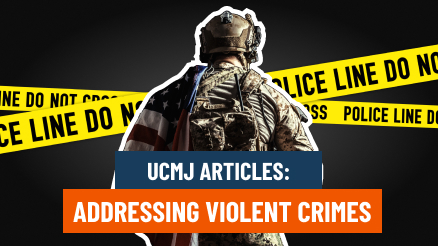Serving all 7 continents
Punitive Articles of the UCMJ
At Bilecki Law Group, we believe that every charge under the punitive articles of the UCMJ can be fought and defeated. We fly in court martial defense lawyers anywhere in the world and take the fight right to the heart of the prosecution.
Search Articles By Category:
A Brief Guide
Court Martial Defense - Punitive Articles of the UCMJ
The most important thing one must understand about the punitive articles of the UCMJ is that they exist for the singular purpose of preserving military order and discipline. In order for this to work, the military justice system requires that they make a public example out of someone by destroying their lives, guilt or innocence be damned. If you don’t fight back, they will make that example out of you.
The punitive articles are rarely enforced with any level of consistency from command to command. This inconsistency in enforcement throws service members into a whirlpool of unpredictability, as commands differ widely on what they consider important. You could just as easily end up facing charges for making the CO look like a fool during the last field exercise as you are for any actual misconduct.
Take a look at the UCMJ articles below to understand the charges, their elements, possible punishments, typical scenarios, and essential insights—whether you’re under investigation, actively fighting the charges, or contemplating the implications of a conviction.
Violent Crimes
-
Article 85: Desertion
-
Article 87a: Resistance, Flight, Breach Of Arrest And Escape
-
Article 87b: Correctional custody-offenses against
-
Article 87(b): Jumping From Vessel Into The Water
-
Article 87b(c): Restriction, Breaking
-
Article 89: Disrespect Toward a Superior Commissioned Officer
-
Article 90: Assaulting or Willfully Disobeying a Superior Commissioned Officer
-
Article 91: Insubordinate Conduct Towards Warrant Officer, Noncommissioned Officer, Or Petty Officer
-
Article 93: Cruelty And Maltreatment
-
Article 94: Mutiny And Sedition
-
Article 95: Resistance, Flight, Breach Of Arrest And Escape
-
Article 95a: Sentinel or Lookout: Offenses Against or By
-
Article 114d: Weapon: Concealed, Carrying
-
Article 115: Threat, Communicating
-
Article 118: Murder
-
Article 119: Manslaughter
-
Article 119a: Death Or Injury Of An Unborn Child
-
Article 119b: Child Endangerment
-
Article 124: Maiming
-
Article 125: Kidnapping
-
Article 128: Assault
-
Article 128b: Domestic Violence
-
Article 129: Burglary
-
Article 129b: Unlawful Entry

Financial Crimes
-
Article 121: Larceny And Wrongful Appropriation
-
Article 121b: False Pretenses, Obtaining Services Under
-
Article 122: Robbery
-
Article 122a: Knowingly Receiving, Buying, Or Concealing Stolen Property
-
Article 123: Forgery
-
Article 123a: Making, Drawing, Or Uttering Check, Draft, Or Order Without Sufficient Funds
-
Article 124a And 124b: Bribery And Graft
-
Article 132: Frauds Against The United States

Other Articles
-
Article 77: Principals
-
Article 78: Accessory After the Fact
-
Article 79: Conviction of Lesser Included Offense
-
Article 80: Attempts
-
Article 81: Conspiracy
-
Article 82: Solicitation
-
Article 83: Malingering
-
Article 84: Quarantine: Medical, Breaking
-
Article 86: Absence Without Leave
-
Article 87: Missing Movement
-
Article 88: Contempt Toward Officials
-
Article 92: Failure To Obey Order Or Regulation
-
Article 96: Releasing Prisoner Without Proper Authority
-
Article 97: Unlawful Detention
-
Article 98: Noncompliance With Procedural Rules
-
Article 99: Misbehavior Before The Enemy
-
Article 100: Subordinate Compelling Surrender
-
Article 101: Improper Use Of Countersign
-
Article 102: Forcing A Safeguard
-
Article 103: Spying
-
Article 104: Public Record: Altering, Concealing, Removing, Mutilating, Obliterating Or Destroying
-
Article 104a: Fraudulent Enlistment, Appointment, or Separation
-
Article 105: Forgery - Making, Altering, Uttering
-
Article 105a: False Or Unauthorized Pass Offense
-
Article 106: Impersonating a Commissioned Officer, or an Agent
-
Article 106a: Espionage
-
Article 106a: Wearing Unauthorized Insignia, Decoration, Badge, Ribbon, Device, Or Lapel Button
-
Article 107: False Official Statement
-
Article 107a: Parole, Violation Of
-
Article 107b: False Swearing
-
Article 108: Military Property Of The U.S., Sale, Loss, Damage, Destruction, Or Wrongful Disposition
-
Article 109: Property Other Than Military Property Of The U.S. – Waste, Spoilage, Or Destruction
-
Article 109a: Mail: Taking, Opening, Secreting, Destroying, Or Stealing
-
Article 110: Improper Hazarding Of Vessel
-
Article 113: Misbehavior Of Sentinel Or Lookout
-
Article 114: Reckless Endangerment
-
Article 114c: Firearm, Discharging Through Negligence
-
Article 114d: Weapon: Concealed, Carrying
-
Article 116: Riot Or Breach Of Peace
-
Article 117: Provoking Speeches or Gestures
-
Article 126: Arson Related Offense
-
Article 126c: Burning With Intent To Defraud
-
Article 127: Extortion
-
Article 130: Stalking
-
Article 131: Perjury And Obstruction Of Justice
-
Article 131a: Subornation Of Perjury
-
Article 131b: Obstructing Justice
-
Article 131c: Misprison Of A Serious Offense
-
Article 131d: Wrongful Refusal To Testify
-
Article 131e: Seizure: Destruction, Removal, Or Disposal Of Property To Prevent
-
Article 131g: Wrongful Interference With An Adverse Administrative Proceeding
-
Article 133: Conduct Unbecoming An Officer And Gentleman
-
Article 134: General Offenses


Can I Fight UCMJ Article 120 and Article 134 Sex Offenses?
Not only can you fight, but you must fight Article 120 and 134 sex offense charges. The era of Sexual Harassment/Assault Response and Prevention (SHARP) has ushered in numerous injustices that are destroying the lives of good men and women in uniform. Just a few of those injustices include:
Allegations and mere rumors are being treated by commands as objective fact: Commands and OSTC are under immense pressure to look tough on the issue of sexual assault and mere scuttlebutt is enough evidence for them to come looking for you.
SHARP / SAPR has been weaponized by fellow service members: They have learned a false charge of sexual assault is enough to get them out of their own trouble with the UCMJ. False allegations are being used as vindictive measures by scorned lovers because they know the UCMJ will destroy their former partner, and potentially make them wealthy in the process.
Even without evidence, careers are being ended administratively: That’s right, even when OSTC does not have enough evidence to prefer charges, commands are seeking retribution by ending careers through administrative measures or revoking flight status. It’s not right and it certainly is not justice.
If you are facing charges under Article 120, 134 or any other UCMJ article, you have a fight on your hand whether you want one or not. Your guilt is assumed and the military justice system is coming to destroy you as we speak. You cannot coexist with a military justice system that is out to destroy you. You must fight back and get us into that fight.
Can I Fight Charges Under The UCMJ If I Know I’m Guilty?
It is a rare thing under the sun for a service member to be guilty of every single charge the prosecution throws at them. That’s because the military justice system likes to pile on the charges in order to scare you into admitting guilt and taking the first garbage deal the prosecution lays out. They are desperate for an easy win and that is what we deny them.
Your best option is to fight like hell until experienced counsel tells you otherwise, even if you are guilty of some charge. At times, the right strategy becomes securing for yourself the best possible outcome.
Look, if you were found in a compromising situation with the Battalion XO’s wife, you’re in trouble. However, you didn’t sexually assault anyone. You didn’t drug her or abuse her. Don’t let commands pile on the bs charges because they are embarrassed and looking for payback.
Do not let them scare you into admitting guilt. You can fight back and you can win. You just need experienced court martial defense counsel by your side. The military justice system boasts a high conviction rate and you play by their rules on their battlefield, you will lose. Bilecki takes the fight right to the heart of the military justice system and we do not pull our punches. We fly in hard-hitting attorneys anywhere in the world to fight by your side.


Court Martial Defense In Any Country For Any Charge
Bilecki Law Group is located in Tampa, Florida, but we’ve made the entire world our AOR. We’re a global military court martial defense team that the prosecution has learned to dread. We take the cases that others think are unwinnable and secure seemingly impossible outcomes for our clients.
Namesake and founder, Tim Bilecki, spent years inside the military justice system as a senior defense counsel for the Army. He will tell you first hand just how stacked the deck is in favor of the prosecution. He employs a no holds barred approach that levels the odds because he knows the prosecution hates a fight.
We shred the prosecution’s witnesses during cross examination, regardless of how much brass is on their shoulders. We conduct our own investigations because we know that the work of military investigators is absolute trash. We hold nothing back. Read the UCMJ articles that we’ve provided for you and assume that prosecutors are gunning to convict you. You must fight back and most importantly, get us into that fight.


